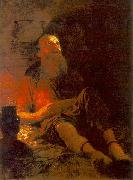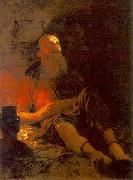Mihaly Zichy Huiler la Reproduction de TableauAll Mihaly Zichy Oil Paintings(Hungarian pronunciation: [ˈmihaːj ˈzitʃi]; German: Michael von Zichy; October 15, 1827, Zala, Hungary - February 28, 1906, St. Petersburg, Russia) was a Hungarian painter and graphic artist. Mihely Zichy was a significant representative of Hungarian romantic painting. During his law studies in Pest from 1842, he attended Jakab Marastoni's school as well. In Vienna he was Waldmeller's pupil in 1844. "Life Boat", his first major work, comes from this time. On Waldmeller's recommendation, he became an art teacher in St. Petersburg. He swore allegiance to freedom by painting the portrait of Lajos Batthyeny, the first Hungarian prime minister, in 1849. From 1850 onwards, he worked as a retoucher, but he also did pencil drawings, water colours and portraits in oil. The series on the Gatchina hunting ordered by the Russian tsar raised him to a court artist. He founded a society to support painters in need. "Autodafe" on the horrors of Spanish inquisition was painted in 1868. He travelled around Europe in 1871, and settled down in Paris in 1874. He painted "Queen Elisabeth is Laying Flowers by the Coffin of Ferenc Deek" on Treffort's order. "Drinking Bout of Henry III", his next large scale picture came from 1875. "The Victory of the Genius of Destruction" painted for the Paris Exhibition was banned by French authorities because of its daring antimilitarist message. He left Paris in 1881 and returned to St. Petersburg after short stays in Nizza, Vienna and Zala (village). From this time onwards, he was mostly engaged in illustrations ("The Tragedy of Man" by Made - h, 1887, and twenty-four ballads of Jenos Arany, 1894 - 98). |
|||

|
|||
|
|
|||
|
||||||||||||
| Mihaly Zichy (Hungarian pronunciation: [ˈmihaːj ˈzitʃi]; German: Michael von Zichy; October 15, 1827, Zala, Hungary - February 28, 1906, St. Petersburg, Russia) was a Hungarian painter and graphic artist. Mihely Zichy was a significant representative of Hungarian romantic painting. During his law studies in Pest from 1842, he attended Jakab Marastoni's school as well. In Vienna he was Waldmeller's pupil in 1844. "Life Boat", his first major work, comes from this time. On Waldmeller's recommendation, he became an art teacher in St. Petersburg. He swore allegiance to freedom by painting the portrait of Lajos Batthyeny, the first Hungarian prime minister, in 1849. From 1850 onwards, he worked as a retoucher, but he also did pencil drawings, water colours and portraits in oil. The series on the Gatchina hunting ordered by the Russian tsar raised him to a court artist. He founded a society to support painters in need. "Autodafe" on the horrors of Spanish inquisition was painted in 1868. He travelled around Europe in 1871, and settled down in Paris in 1874. He painted "Queen Elisabeth is Laying Flowers by the Coffin of Ferenc Deek" on Treffort's order. "Drinking Bout of Henry III", his next large scale picture came from 1875. "The Victory of the Genius of Destruction" painted for the Paris Exhibition was banned by French authorities because of its daring antimilitarist message. He left Paris in 1881 and returned to St. Petersburg after short stays in Nizza, Vienna and Zala (village). From this time onwards, he was mostly engaged in illustrations ("The Tragedy of Man" by Made - h, 1887, and twenty-four ballads of Jenos Arany, 1894 - 98). |
||||||||||||
|
|
||||||||||||
| ID de tableau:: 83135 Captive in the Prison Captive in the Prison Date 1850s Medium Oil on canvas Dimensions 138 x 100 cm (54.3 x 39.4 in) cjr Date 1850s Medium Oil on canvas Dimensions 138 x 100 cm (54.3 x 39.4 in) cjr |
||||||||||||
|
|
||||||||||||
| ID de tableau:: 87273 Captive in the Prison Captive in the Prison 1850s Medium Oil on canvas Dimensions 138 x 100 cm (54.3 x 39.4 in) cyf 1850s Medium Oil on canvas Dimensions 138 x 100 cm (54.3 x 39.4 in) cyf |
||||||||||||
|
|
||||||||||||
|
| Artiste précédent Artiste prochain | |||||||||||
|
|
||||||||||||
|
Mihaly Zichy (Hungarian pronunciation: [ˈmihaːj ˈzitʃi]; German: Michael von Zichy; October 15, 1827, Zala, Hungary - February 28, 1906, St. Petersburg, Russia) was a Hungarian painter and graphic artist. Mihely Zichy was a significant representative of Hungarian romantic painting. During his law studies in Pest from 1842, he attended Jakab Marastoni's school as well. In Vienna he was Waldmeller's pupil in 1844. "Life Boat", his first major work, comes from this time. On Waldmeller's recommendation, he became an art teacher in St. Petersburg. He swore allegiance to freedom by painting the portrait of Lajos Batthyeny, the first Hungarian prime minister, in 1849. From 1850 onwards, he worked as a retoucher, but he also did pencil drawings, water colours and portraits in oil. The series on the Gatchina hunting ordered by the Russian tsar raised him to a court artist. He founded a society to support painters in need. "Autodafe" on the horrors of Spanish inquisition was painted in 1868. He travelled around Europe in 1871, and settled down in Paris in 1874. He painted "Queen Elisabeth is Laying Flowers by the Coffin of Ferenc Deek" on Treffort's order. "Drinking Bout of Henry III", his next large scale picture came from 1875. "The Victory of the Genius of Destruction" painted for the Paris Exhibition was banned by French authorities because of its daring antimilitarist message. He left Paris in 1881 and returned to St. Petersburg after short stays in Nizza, Vienna and Zala (village). From this time onwards, he was mostly engaged in illustrations ("The Tragedy of Man" by Made - h, 1887, and twenty-four ballads of Jenos Arany, 1894 - 98). |
||||||||||||
|
|
||||||||||||
|
CONTACTER DES Etats-Unis |







